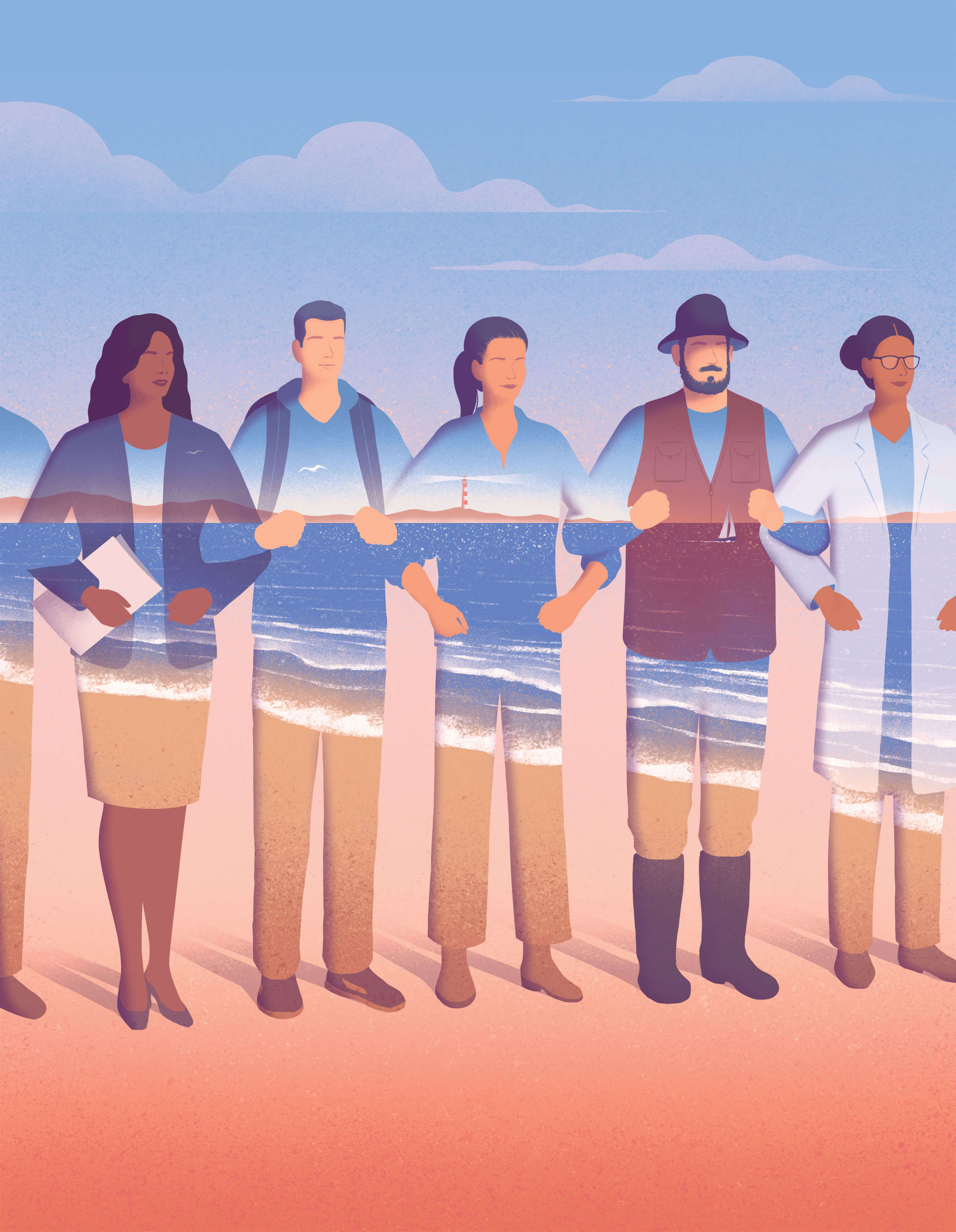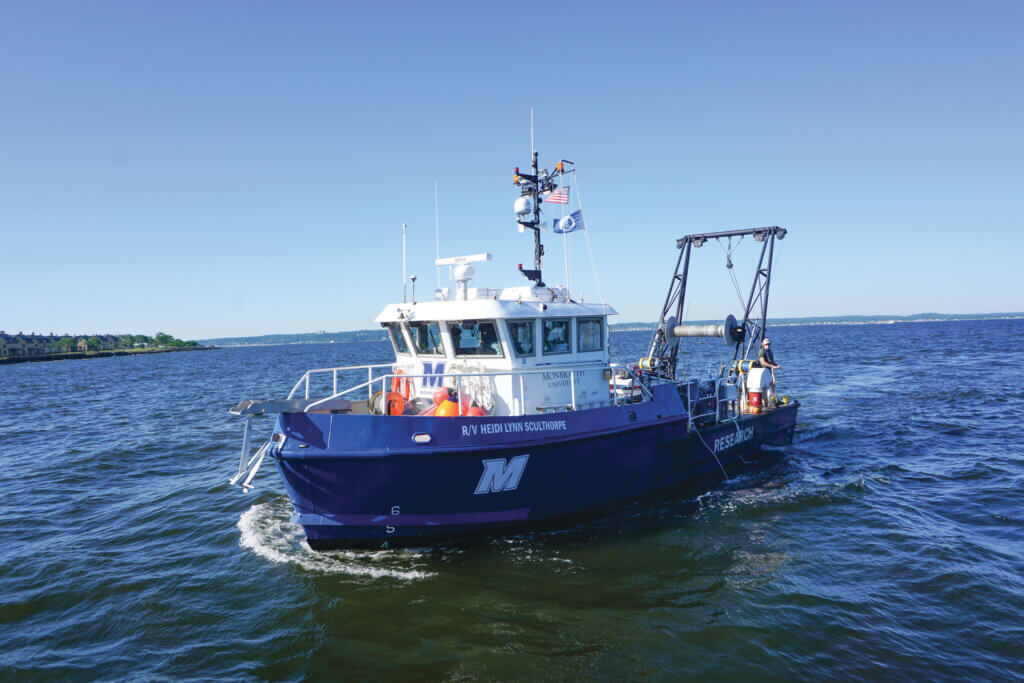
Guardians of the Coast
For 20 years, Monmouth’s Urban Coast Institute has championed science, policy, and partnerships to protect coastal ecosystems and the communities that depend on them.
America’s coastlines face several pressing threats, with climate change and its associated impacts. Rising sea levels pose significant risks of flooding, beach erosion, and habitat loss, while more intense storms and hurricanes bring destructive storm surges. Warming ocean temperatures and acidification threaten marine biodiversity, undermining the economic and cultural resources that rely on healthy coastal environments. Human activities such as overdevelopment, pollution, and unsustainable fishing practices only exacerbate the impact of climate change.
Responding to these threats requires innovative, science-based solutions and collaboration across disciplines and industries. Since 2005, Monmouth University’s Urban Coast Institute (UCI) has been at the forefront of that mission. By blending research, education, and community partnerships, the UCI has helped create, implement, and support policies that balance environmental sustainability with economic and social needs.
To mark the UCI’s 20th anniversary, we spoke with its director, Tony MacDonald, about the institute’s impact over the past two decades and its ongoing work to protect and sustain our coastal environments.
How did the UCI get started, and what is your focus?
In 2004, the University was developing a strategic plan and recognized that one unique aspect of Monmouth University that attracted students is that we are located just a mile from the beach. Monmouth already offered a marine and environmental biology and policy degree, and it was decided that also establishing an institute focusing on coastal and ocean issues was a good idea and opportunity.
I’m a lawyer who previously worked for the City of New York, and for 18 years in Washington, DC, doing coastal policy and advocacy. The opportunity to become the first director of the Urban Coast Institute seemed like a perfect fit for a guy with my experience and deep Jersey Shore roots.
At the UCI, we study how we can live, work, and play sustainably and in harmony with our environment. We approach issues holistically, looking at the coastal environment, economy, social equity, and quality of life issues. We focus on policy and management approaches that support healthy coastal ecosystems, sustainable ocean and coastal economies, and communities that are resilient to sea-level rise and coastal storms. For example, I serve as the facilitator of the Mid-Atlantic Ocean Planning Committee, which brings representatives from five states from New York to Virginia together with federal agency and tribal representatives to support greater collaboration.
What are the most pressing threats to our coastal ecosystems?
We can never take our eye off the ball of fundamental pollution issues. Everybody cares about ensuring water quality and that fish and wildlife are thriving. We have a legacy of bad past practices, such as filling and developing wetlands and failing to upgrade antiquated combined sewer systems that discharge untreated sewage into our rivers and bays during storm events.
There are emerging issues that pose challenges, including the impacts of climate change and the scourge of plastic pollution. Recent studies show that the amount of plastic in the ocean will soon exceed the total biomass of fish. Ocean temperatures are warming significantly and getting more acidic. These changes have adverse impacts for shellfish and other marine organisms, fish habitats, and the fishers that rely on them for their livelihoods.
The threats of sea-level rise are amplified significantly by the damage caused by more intense and frequent storms. The UCI is working to help communities become more resilient and adapt to these threats. What are the alternatives to hardening the shoreline and continuing to put sand on beaches? The UCI is working with the state and other partners to encourage restoration and more natural and nature-based solutions, to adopt policies that take sea-level rise into consideration, and to guide development to make communities less vulnerable.
While it is not always easy these days to bring together different groups around areas of conflict and develop a consensus, supporting healthy coasts and oceans can be a unifying goal.
Can you explain what “resilience” means in the UCI’s work?
It is about how we can take actions to mitigate the risk from future storm events and reduce the vulnerability of communities so they can quickly bounce back and recover from storms. After Sandy, the UCI developed recommendations for the state on how it might improve laws to enhance community resilience. Currently, UCI Associate Director Tom Herrington is a managing director of the New Jersey Coastal Resilience Collaborative, which brings together over 100 groups to identify best practices and work together to make communities more resilient.
The UCI has established a great partnership with Naval Weapons Station Earle, which is interested in making sure that its facilities and the communities around them are resilient. With congressional funding championed by Rep. Frank Pallone, UCI staff are also doing cutting-edge research at Earle to determine the potential for oyster restoration to reduce storm impacts while improving water quality.
What are some of the UCI’s milestones over the past 20 years?
The UCI was launched in 2005 with its first Future of the Ocean Symposium and Champion of the Ocean Awards. We honored Leon Panetta and Admiral James Watkins, the chairs, respectively, of the Pew Ocean Commission and U.S. Commission on Ocean Policy. This has become a signature annual event that brings state, regional, and national ocean leaders to campus ranging from explorers Jean-Michel Cousteau and Sylvia Earle; to NOAA Administrators Kathy Sullivan, Tim Gallaudet, and Rick Spinrad; to New Jersey Govs. Tom Kean, James Florio, and Christine Todd Whitman.
In 2017, we negotiated with NOAA to transfer to Monmouth, at no cost, a 49-foot research vessel. The UCI raised the funds to equip the vessel for research, student field work, and classes. It was named in memory of Heidi Lynn, daughter of former Board of Trustees Chair Bob Sculthorpe (’63, ’15HN). This would not have been accomplished without the generous support of Bob, the Fairleigh S. Dickinson Jr. Foundation, and [Monmouth University Trustee] George Kolber.

The UCI’s Marine Science & Policy Initiative (MSPI) sprung from a successful challenge grant in which the Rechnitz family pledged $3 million if the University could raise $2 million in matching gifts. The MSPI significantly expanded funding for student and faculty research and major renovations to the School of Science, and established an endowed professor of marine science. The initiative also supported a collaboration with the Rockefeller University Program for the Human Environment hosting major national conferences on ocean exploration and marine environmental DNA. The generosity of the Rechnitz family also supported the establishment of the Rechnitz/UCI endowed chair of marine and environmental law and policy.
The UCI received a series of grants from the Gordon and Betty Moore Foundation supporting regional ocean planning and development of the Mid-Atlantic Ocean Data Portal. The portal includes over 6,000 publicly accessible data layers and is recognized as an essential tool for regional ocean planning, including reducing potential conflicts around proposed offshore wind farms, marine navigation, fisheries, and other ocean uses.
How does the UCI engage the campus community—especially students?
In addition to the Future of the Ocean Symposium, the UCI hosts many other high-profile events on campus that are open to students and often showcase their work.
The UCI provides direct financial support for student and faculty research through its Heidi Lynn Sculthorpe Scholars grant program. Since 2015, we’ve supported 132 students in 63 research projects. Students are supported to collaborate directly with UCI staff on projects. UCI staff also serve as advisors and mentors to students pursuing internships, honors theses, and experiential learning opportunities.
Thanks to the generosity of members of the UCI Advisory Committee, four endowed scholarships have been established to provide partial support for students with a demonstrated interest in marine science, environment, policy, or other related field.
Looking ahead, how will the UCI continue to build on its legacy while addressing emerging issues?
We’re committed to seeking external funding to sustain and build upon what we have achieved. Our work aligns well with the University priorities to enhance excellence, access, and ambition. There is a particular need to work with communities disproportionately impacted by climate change. With support from Sen. Cory Booker, we received funding to hire a community liaison to assist disadvantaged communities to plan for resilience. The UCI is a partner in a major state Building a Climate Ready NJ grant that will provide additional support for this work and our other climate resilience initiatives.
We will continue to prioritize academic engagement and collaboration with faculty doing related work. For example, Endowed Professor of Marine Science Jason Adolf and Associate Professor of Biology Keith Dunton are doing research on how to use marine environmental DNA and acoustics to better understand the potential impacts of offshore activities on fisheries and endangered species.
The UCI and the School of Science are in discussions with NOAA’s James J. Howard Marine Sciences Laboratory at Sandy Hook about extending a cooperative research and development agreement. We’ve received funding with the support of Congressman Pallone to collaborate with the Sandy Hook Lab on projects looking at herring and other at-risk species. State Sen. Vin Gopal has helped to secure state funds to expand collaborative research with Rutgers and other state academic institutions to better understand and take actions to reduce the impacts of storms on coastal communities.
The UCI is a small organization, but we are nimble and leverage external funding and partnerships to impact coastal and ocean management and policy. While it is not always easy these days to bring together different groups around areas of conflict and develop a consensus, supporting healthy coasts and oceans can be a unifying goal. The UCI has developed into a trusted broker, and Monmouth University is uniquely located and well-positioned to take on this work.